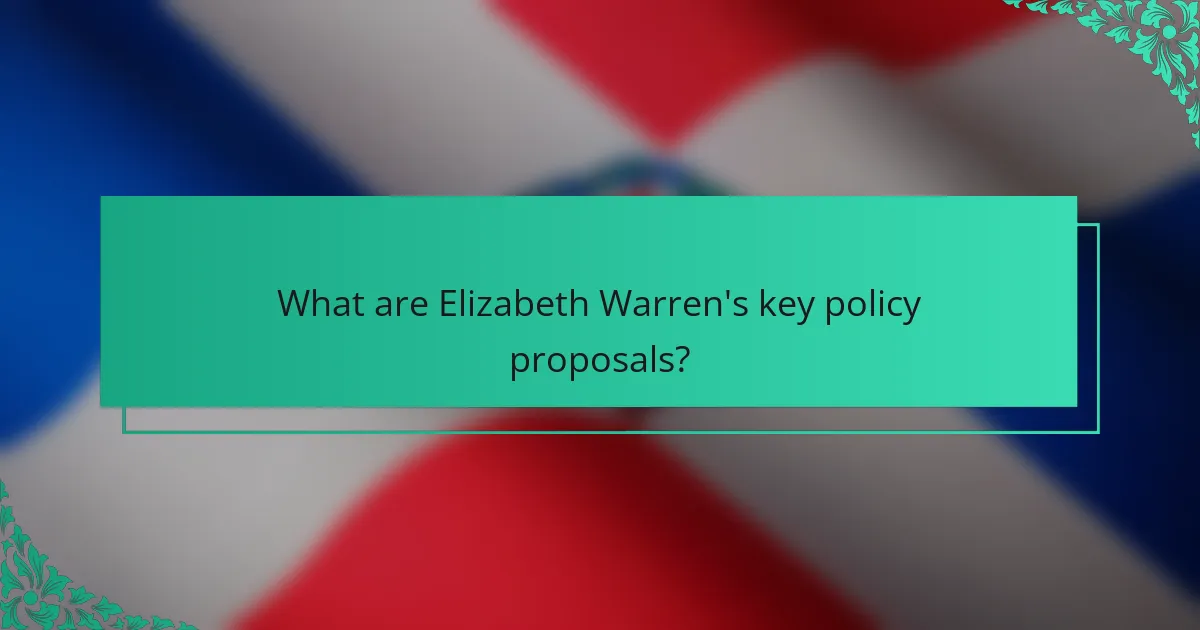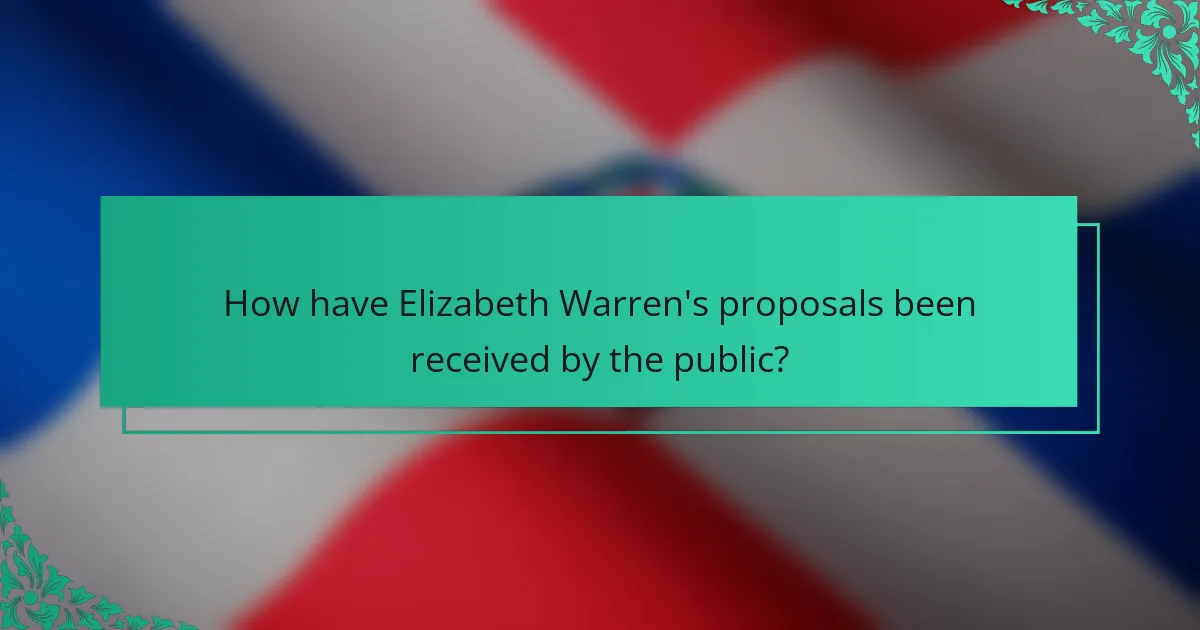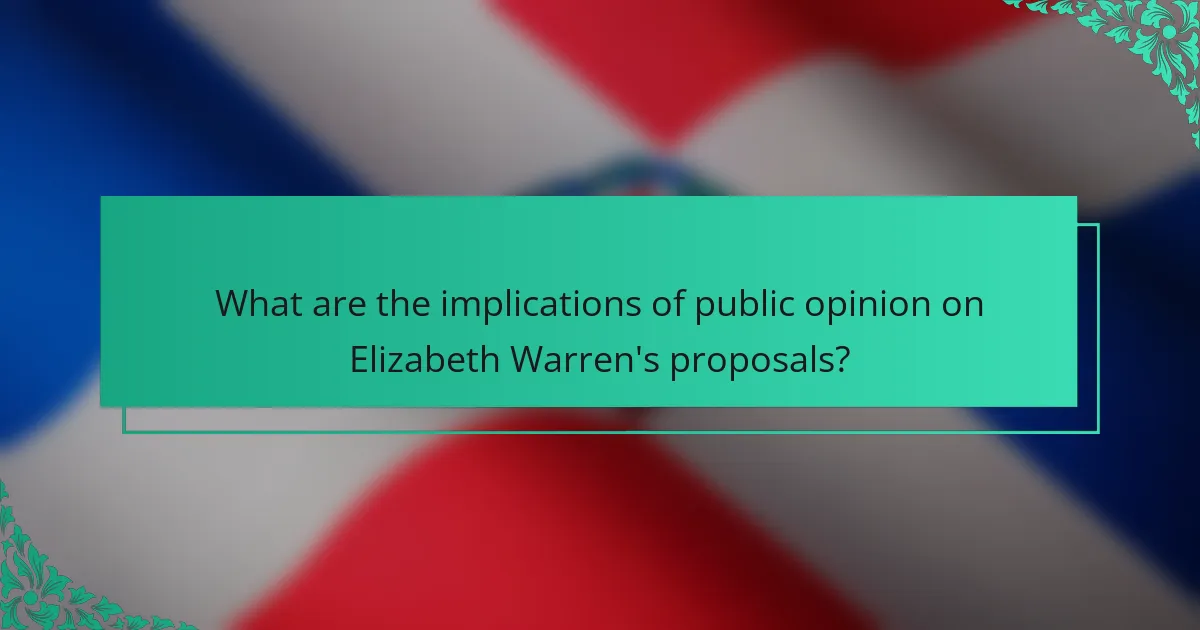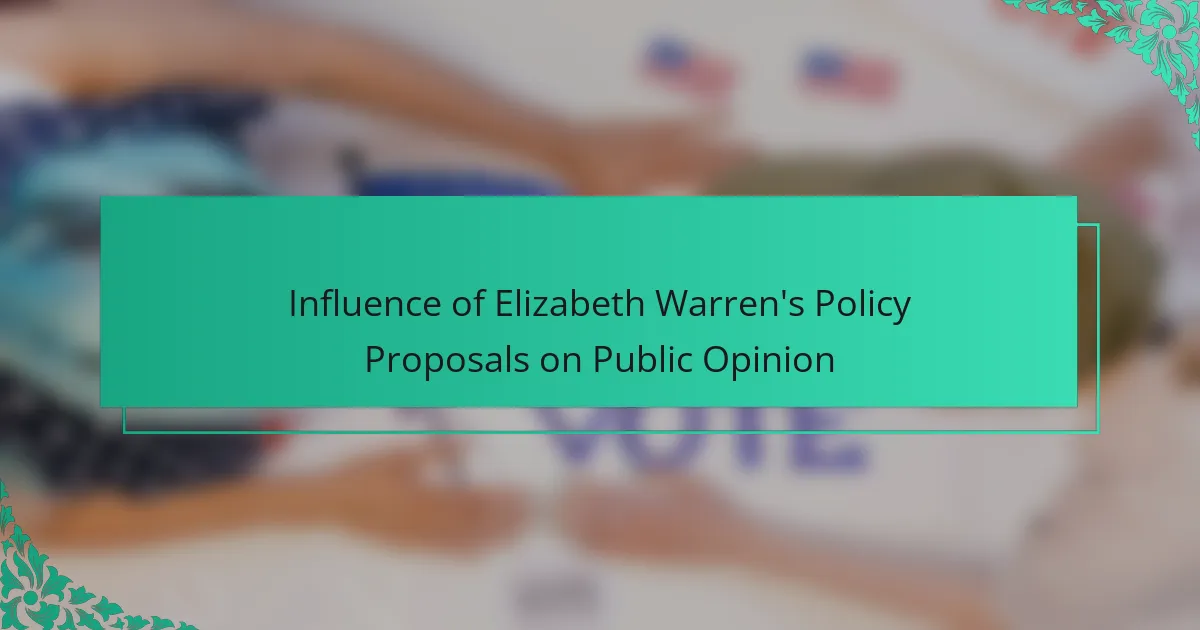Elizabeth Warren is a prominent political figure known for her policy proposals aimed at addressing economic inequality, healthcare reform, and corporate regulation. Her key initiatives include a wealth tax on the ultra-rich, Medicare for All, student loan forgiveness, and breaking up large tech companies to enhance competition. Public opinion plays a significant role in shaping the reception of these proposals, with strong support among younger voters and skepticism from older demographics. The article explores how Warren’s policies influence public sentiment and the implications for their feasibility and potential success in Congress.

What are Elizabeth Warren’s key policy proposals?
Elizabeth Warren’s key policy proposals focus on economic equality, healthcare reform, and corporate regulation. She advocates for a wealth tax on the ultra-rich, aiming to reduce income inequality. Warren proposes Medicare for All, which seeks to provide universal healthcare coverage. Her policies also include student loan forgiveness to alleviate the burden of education debt. Additionally, she emphasizes breaking up large tech companies to foster competition. Warren supports increasing the minimum wage to ensure a living wage for workers. Her proposals often highlight the need for stronger consumer protection laws. These initiatives reflect her commitment to addressing systemic issues within the economy and society.
How do these proposals reflect her political ideology?
Elizabeth Warren’s proposals reflect her progressive political ideology by prioritizing economic equality and corporate regulation. Her focus on wealth tax and student loan forgiveness showcases her commitment to reducing income disparity. These initiatives aim to empower the middle class and alleviate financial burdens on students. Additionally, her advocacy for universal healthcare emphasizes her belief in accessible healthcare for all citizens. Warren’s stance against large corporations indicates her desire to hold them accountable for contributing to social issues. Her proposals resonate with voters who support systemic change and social justice. Overall, her policy framework aligns with progressive values aimed at fostering equity in society.
What specific issues do her proposals address?
Elizabeth Warren’s proposals address economic inequality, corporate regulation, and student debt relief. Her economic inequality initiatives aim to reduce wealth gaps among different social classes. Warren’s corporate regulation proposals focus on increasing oversight of large corporations to ensure fair practices. Additionally, her student debt relief plan seeks to alleviate the financial burden on borrowers. These issues are critical in shaping public opinion on economic justice and reform.
How do her proposals compare to those of other politicians?
Elizabeth Warren’s proposals often emphasize progressive reforms, such as wealth tax and universal healthcare. Compared to other politicians, her ideas are typically more ambitious and detailed. For instance, her wealth tax proposal targets ultra-millionaires, aiming to reduce income inequality. In contrast, many politicians advocate for more moderate tax reforms. Warren’s healthcare plan seeks to implement Medicare for All, while some politicians prefer a public option. Her focus on corporate regulation is also more pronounced than that of many centrist politicians. Overall, Warren’s proposals are seen as more left-leaning and comprehensive within the current political landscape.
Why is public opinion important in the context of her proposals?
Public opinion is crucial in the context of Elizabeth Warren’s proposals because it directly influences policy effectiveness. When public sentiment aligns with her initiatives, it can enhance support for legislation. High public approval can lead to increased political pressure on lawmakers to adopt her proposals. Conversely, negative public opinion may hinder the implementation of her ideas. Research shows that politicians often respond to public opinion to secure electoral success. For example, a Pew Research study indicates that 70% of voters consider public sentiment when making legislative decisions. Therefore, understanding and addressing public opinion is essential for the success of Warren’s policy proposals.
How does public opinion influence policy-making?
Public opinion significantly influences policy-making by shaping the priorities of elected officials. When a majority of citizens express support for a specific policy, lawmakers often respond to align with voter preferences. This dynamic is evident in democratic systems where elected representatives seek re-election. For example, a 2020 Pew Research Center survey found that 78% of Americans supported expanding access to healthcare. Lawmakers who prioritize this issue are more likely to gain public approval. Additionally, public opinion can mobilize grassroots movements that pressure policymakers to act. High-profile cases, such as climate change advocacy, demonstrate how collective public sentiment can lead to legislative action.
What factors shape public opinion on policy proposals?
Public opinion on policy proposals is shaped by several key factors. These factors include media coverage, public discourse, personal experiences, and political affiliation. Media coverage influences perceptions by framing issues in specific ways. Public discourse through social networks and community discussions can amplify or diminish support. Personal experiences with related issues often inform individual viewpoints. Political affiliation plays a significant role in how proposals are received, often aligning opinions with party ideologies. Additionally, demographic factors such as age, education, and socioeconomic status can also impact public opinion. Research indicates that these elements interact dynamically, affecting how proposals are evaluated by the public.

How have Elizabeth Warren’s proposals been received by the public?
Elizabeth Warren’s proposals have received a mixed reception from the public. Many supporters praise her plans for wealth tax and student loan forgiveness. They argue these initiatives address economic inequality and student debt crises. However, critics express concerns about the feasibility and potential economic impact of her proposals. Polls indicate significant support among younger voters, while older demographics show more skepticism. For example, a 2021 Gallup poll revealed that 60% of voters aged 18-29 favored her economic policies. In contrast, only 35% of those aged 65 and older expressed similar support. This divide highlights varying perceptions based on age and economic status. Overall, Elizabeth Warren’s proposals resonate strongly with specific voter segments while facing opposition from others.
What methodologies are used to gauge public opinion on her proposals?
Surveys and polls are commonly used methodologies to gauge public opinion on Elizabeth Warren’s proposals. These tools collect data from a representative sample of the population. Surveys often include questions that assess approval or disapproval of specific policies. Polling organizations may use random sampling techniques to ensure accuracy. Focus groups also provide qualitative insights into public sentiment. They allow for in-depth discussions about perceptions of her proposals. Social media analysis is another method, tracking public reactions online. This approach can reveal trends and shifts in opinion over time. Each methodology contributes to a comprehensive understanding of public opinion.
What surveys and polls have been conducted regarding her proposals?
Surveys and polls have been conducted to assess public opinion on Elizabeth Warren’s proposals. A notable example is the 2020 Morning Consult poll. This poll indicated that 67% of voters supported her wealth tax proposal. Additionally, a Gallup poll from the same year showed that 61% of respondents favored her plan for universal healthcare. These surveys reflect a significant interest in her policy ideas among the electorate.
How do demographic factors impact public perception of her proposals?
Demographic factors significantly impact public perception of Elizabeth Warren’s proposals. Age, income, education, and ethnicity shape how different groups view her policies. For example, younger voters tend to support her progressive ideas more than older voters. Higher-income individuals may oppose her wealth tax proposals due to perceived personal financial implications.
Education level also plays a crucial role; those with higher education often align with her stance on student debt relief. Ethnic minorities frequently resonate with her proposals addressing systemic inequality. According to a 2020 Pew Research study, 68% of Black voters supported her economic policies compared to 47% of White voters. Therefore, understanding these demographic influences is essential for analyzing public opinion on her proposals.
What are the trends in public opinion regarding her policy proposals?
Public opinion regarding Elizabeth Warren’s policy proposals shows a growing support trend among progressive voters. Recent polls indicate that her proposals on wealth tax and healthcare reform resonate well with younger demographics. Data from a 2023 survey by YouGov revealed that 60% of respondents favor her wealth tax initiative. Additionally, her stance on student loan forgiveness has gained traction, with a 55% approval rate among college-educated voters. However, some moderate voters remain skeptical, reflecting a divide in public sentiment. Overall, the trend highlights a significant alignment with progressive values, particularly among younger voters.
How has public opinion changed over time?
Public opinion has shifted significantly over time regarding various issues. For instance, attitudes towards healthcare reform have evolved, with increasing support for universal healthcare in recent years. According to a 2021 Gallup poll, 60% of Americans favored a government-run healthcare system, up from 50% in 2019. Similarly, views on wealth inequality have changed, with more people recognizing it as a critical issue. A Pew Research Center survey in 2020 revealed that 70% of respondents believed the government should do more to address wealth disparities. Additionally, public sentiment towards student debt relief has grown, with a 2022 poll indicating that 55% of Americans supported canceling some student debt. These changes reflect broader societal trends and the impact of political figures like Elizabeth Warren advocating for progressive policies.
What specific proposals have garnered the most support or opposition?
Elizabeth Warren’s proposals on wealth tax and student loan forgiveness have garnered significant support. The wealth tax proposal aims to tax the ultra-wealthy to fund social programs. Polls indicate that a majority of Americans support this tax as a means to reduce inequality. Conversely, her Medicare for All proposal has faced substantial opposition. Critics argue it could lead to increased taxes and reduced healthcare quality. Surveys show a divided public opinion on this healthcare plan, with many expressing concerns over its feasibility.

What are the implications of public opinion on Elizabeth Warren’s proposals?
Public opinion significantly influences Elizabeth Warren’s proposals. High approval ratings can lead to increased political support for her initiatives. Conversely, negative public sentiment may hinder the passage of her policies in Congress. For instance, Warren’s wealth tax faced skepticism, impacting its feasibility. Polls show that public backing can shape legislative priorities. Additionally, strong public opinion can mobilize grassroots movements in support of her proposals. Ultimately, public perception plays a crucial role in determining the success of her policy agenda.
How does public support affect the likelihood of policy implementation?
Public support significantly increases the likelihood of policy implementation. When a majority of the public backs a policy, it creates pressure on policymakers to act. Research indicates that policies with strong public support are more likely to pass through legislative processes. For example, a study by the Pew Research Center found that 70% public approval can lead to a higher success rate in policy adoption. Furthermore, elected officials often consider public opinion in their decision-making to secure votes for future elections. Thus, public backing not only influences immediate policy outcomes but also shapes long-term political strategies.
What role do media portrayals play in shaping public opinion?
Media portrayals significantly influence public opinion by framing issues and shaping perceptions. They determine how audiences interpret political figures and policies. For example, media coverage can highlight specific attributes of a politician, such as Elizabeth Warren’s advocacy for wealth redistribution. This coverage can either bolster support or generate opposition based on the narrative presented. Studies show that positive media portrayals can enhance a politician’s approval ratings. Conversely, negative portrayals can lead to public skepticism and distrust. This dynamic illustrates the power of media in shaping societal views and attitudes.
How do grassroots movements influence public perception of her proposals?
Grassroots movements significantly shape public perception of Elizabeth Warren’s proposals. These movements mobilize community members and amplify voices advocating for specific policies. They create a sense of urgency and relevance around her proposals. Through social media campaigns, they disseminate information quickly, reaching a broad audience. For example, the grassroots support for her wealth tax proposal helped raise awareness and generate public discussions. This engagement fosters a connection between her policies and the public’s needs. Additionally, grassroots movements often organize events that showcase personal stories, making her proposals more relatable. Research indicates that grassroots activism can increase public support for policies by framing them as community-driven solutions.
What can be learned from the public’s response to her proposals?
The public’s response to Elizabeth Warren’s proposals reveals significant insights into voter priorities. Many respondents express strong support for her wealth tax and student debt cancellation plans. This indicates a growing concern about economic inequality among the electorate. Additionally, public feedback shows skepticism towards her healthcare reform proposals. Some voters fear potential tax increases associated with Medicare for All. An analysis of polling data illustrates that her proposals resonate well with younger voters. This demographic values progressive policies aimed at social justice and economic reform. Overall, the public’s reactions highlight the importance of addressing economic issues in political discourse.
How can future policy proposals be crafted based on public feedback?
Future policy proposals can be crafted based on public feedback by systematically incorporating community input into the decision-making process. Engaging the public through surveys, town hall meetings, and social media can provide valuable insights. Analyzing this feedback helps identify key issues and priorities among constituents. This approach ensures that proposals reflect the needs and preferences of the community. For example, Elizabeth Warren has utilized public forums to gather opinions on economic reforms. Research shows that policies developed with public involvement are more likely to gain support and be effective. This method fosters transparency and trust between policymakers and the public.
What strategies can be employed to enhance public support for policy initiatives?
Engaging the public through transparent communication enhances support for policy initiatives. Clear messaging helps citizens understand the policy’s benefits. Utilizing social media platforms increases outreach and fosters engagement. Collaborating with community leaders builds trust and credibility. Organizing public forums allows for direct feedback and involvement. Providing data-driven evidence supports claims and addresses concerns. Tailoring messages to specific demographics ensures relevance and resonance. Lastly, showcasing successful case studies illustrates potential positive impacts.
The main entity of the article is Elizabeth Warren’s policy proposals, which encompass economic equality, healthcare reform, and corporate regulation. The article examines how these proposals, including a wealth tax, Medicare for All, and student loan forgiveness, reflect her progressive political ideology and address systemic issues such as income inequality and corporate accountability. It also analyzes public opinion on her initiatives, highlighting demographic influences and trends in support or opposition, as well as the impact of media portrayals and grassroots movements on shaping public perception. Overall, the discussion emphasizes the significance of public sentiment in determining the feasibility and implementation of Warren’s policy agenda.
